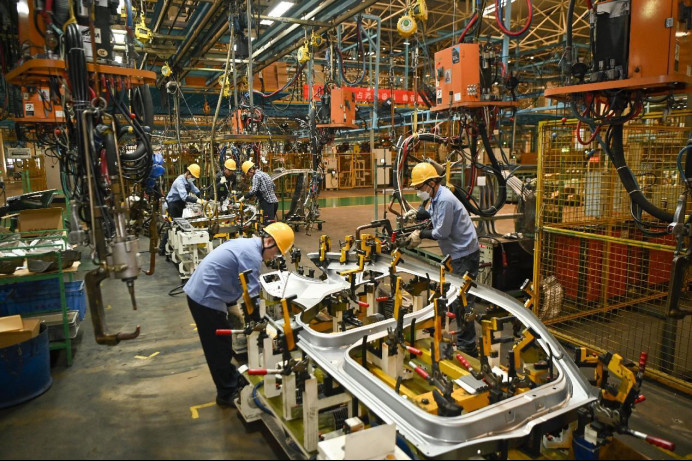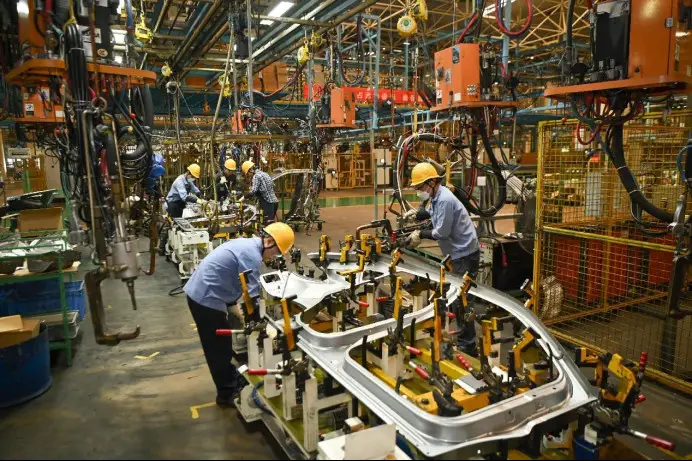By He Yin, People's Daily

Employees of Chinese car maker FAW Haima Automobile Co., Ltd. are busy producing cars to be exported to the Philippines at the company's production base in south China's Hainan province, Sept. 5, 2022. (Photo by Shi Zhonghua/People's Daily Online)
This year marks the 10th anniversary of the Belt and Road Initiative (BRI) proposed by Chinese President Xi Jinping.
At the beginning of 2023, China signed a Memorandum of Understanding (MoU) on the joint construction of the BRI with Turkmenistan and signed an updated MoU on the BRI with the Philippines. This fully demonstrated that the BRI meets the needs of world development, conforms to the expectations of the international community, and always enjoys strong resilience and vitality.
The Belt and Road cooperation embraces the historical trend of economic globalization, responds to the call for improving the global governance system and meets people's longing for a better life, which is the fundamental reason why it always has strong resilience and vitality.
So far, China has signed more than 200 BRI cooperation agreements with 151 countries and 32 international organizations.
In its latest Global Economic Prospects report released on Jan. 10, the World Bank slashed its 2023 global economic growth forecast to 1.7 percent, 1.3 percentage points lower than what it projected last June.
As economic globalization is encountering headwinds and global economic recovery is in the doldrums, the joint construction of the BRI has shown a more important role in boosting the economic growth of relevant countries and regions and promoting the common development of all countries.
A research report released by the World Bank in 2019 showed that transportation infrastructure projects under the BRI, if fully implemented, would generate $1.6 trillion in benefits annually in global revenue by 2030 — accounting for 1.3 percent of global GDP.
More countries will carry out high-quality cooperation under the framework of the BRI, which will be the prevailing trend.
The BRI was proposed by China, yet it generates opportunities and benefits for the entire world.
The initiative has provided new platforms for international trade and investment. Data showed that the cumulative value of trade in goods between China and countries along the BRI routes reached nearly $11 trillion from 2013 to 2021, while the two-way investment hit more than $230 billion.
The initiative has also promoted infrastructure connectivity and made new contributions to the well-being of the people in various countries.
High-quality BRI cooperation conforms to the trend of the Fourth Industrial Revolution. The cooperation has injected new vitality into the ancient Silk Road by seizing opportunities of digital, Internet-based and intelligent development, fostering new growth drivers, exploring new development pathways, and building the digital Silk Road and the Silk Road of innovation.
Martin Albrow, a British sociologist noted for his works on globalization, pointed out that the BRI has connected China's peaceful development with the prosperity and happiness of the whole world.
As an important international public good China has provided for the world to help improve global governance, high-quality BRI cooperation draws on past experience, values innovation, takes the initiative, emphasizes seeking common ground while reserving differences, and promotes incremental reform of the existing international order and rules.
The BRI and its guiding principle of extensive consultation, joint contribution, and shared benefits have been included in relevant documents of the United Nations, the Group of 20 (G20), the Asia-Pacific Economic Cooperation (APEC) and other organizations, becoming an important consensus on global governance.
The establishment of multilateral development institutions and cooperation platforms, such as the Asian Infrastructure Investment Bank (AIIB) and the Silk Road Fund, will contribute to the building of a fairer and more reasonable global governance system.
From visionary blueprints to intensive implementation, the BRI has taken a journey from taking roots to achieving sustainable progress. China's "circle of friends" for joint construction of the BRI has expanded continuously, while the BRI's quality of cooperation has kept improving and its development prospects have grown more promising.
China will consider holding the third Belt and Road Forum for International Cooperation this year to provide fresh impetus for the development and prosperity of the world.
At a new starting point, China is ready to work together with various parties to continue promoting high-quality construction of the road for peace, prosperity, opening up, green development, innovation, and connected civilizations, so that the initiative, a project of the century, will better benefit people across the world.
At the beginning of 2023, China signed a Memorandum of Understanding (MoU) on the joint construction of the BRI with Turkmenistan and signed an updated MoU on the BRI with the Philippines. This fully demonstrated that the BRI meets the needs of world development, conforms to the expectations of the international community, and always enjoys strong resilience and vitality.
The Belt and Road cooperation embraces the historical trend of economic globalization, responds to the call for improving the global governance system and meets people's longing for a better life, which is the fundamental reason why it always has strong resilience and vitality.
So far, China has signed more than 200 BRI cooperation agreements with 151 countries and 32 international organizations.
In its latest Global Economic Prospects report released on Jan. 10, the World Bank slashed its 2023 global economic growth forecast to 1.7 percent, 1.3 percentage points lower than what it projected last June.
As economic globalization is encountering headwinds and global economic recovery is in the doldrums, the joint construction of the BRI has shown a more important role in boosting the economic growth of relevant countries and regions and promoting the common development of all countries.
A research report released by the World Bank in 2019 showed that transportation infrastructure projects under the BRI, if fully implemented, would generate $1.6 trillion in benefits annually in global revenue by 2030 — accounting for 1.3 percent of global GDP.
More countries will carry out high-quality cooperation under the framework of the BRI, which will be the prevailing trend.
The BRI was proposed by China, yet it generates opportunities and benefits for the entire world.
The initiative has provided new platforms for international trade and investment. Data showed that the cumulative value of trade in goods between China and countries along the BRI routes reached nearly $11 trillion from 2013 to 2021, while the two-way investment hit more than $230 billion.
The initiative has also promoted infrastructure connectivity and made new contributions to the well-being of the people in various countries.
High-quality BRI cooperation conforms to the trend of the Fourth Industrial Revolution. The cooperation has injected new vitality into the ancient Silk Road by seizing opportunities of digital, Internet-based and intelligent development, fostering new growth drivers, exploring new development pathways, and building the digital Silk Road and the Silk Road of innovation.
Martin Albrow, a British sociologist noted for his works on globalization, pointed out that the BRI has connected China's peaceful development with the prosperity and happiness of the whole world.
As an important international public good China has provided for the world to help improve global governance, high-quality BRI cooperation draws on past experience, values innovation, takes the initiative, emphasizes seeking common ground while reserving differences, and promotes incremental reform of the existing international order and rules.
The BRI and its guiding principle of extensive consultation, joint contribution, and shared benefits have been included in relevant documents of the United Nations, the Group of 20 (G20), the Asia-Pacific Economic Cooperation (APEC) and other organizations, becoming an important consensus on global governance.
The establishment of multilateral development institutions and cooperation platforms, such as the Asian Infrastructure Investment Bank (AIIB) and the Silk Road Fund, will contribute to the building of a fairer and more reasonable global governance system.
From visionary blueprints to intensive implementation, the BRI has taken a journey from taking roots to achieving sustainable progress. China's "circle of friends" for joint construction of the BRI has expanded continuously, while the BRI's quality of cooperation has kept improving and its development prospects have grown more promising.
China will consider holding the third Belt and Road Forum for International Cooperation this year to provide fresh impetus for the development and prosperity of the world.
At a new starting point, China is ready to work together with various parties to continue promoting high-quality construction of the road for peace, prosperity, opening up, green development, innovation, and connected civilizations, so that the initiative, a project of the century, will better benefit people across the world.
 Menu
Menu
 China's BRI 'circle of friends' expanding
China's BRI 'circle of friends' expanding
















